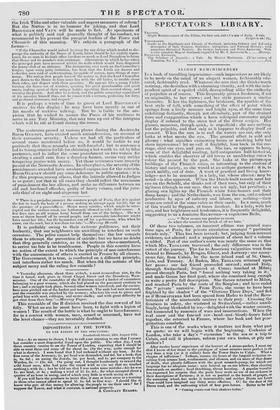SLIGHT REMINISCENCES
Is a book of travelling impressions—such impressions as are likely to be made on the mind of an elegant woman, fashionably edu- cated, fashionably read. Whatever she sees that she thinks worth noticing, she describes with a charming vivacity, and with the inde- pendent spirit of a spoiled child, disregarding alike the authority of prejudice or of reason. This frequently gives a freshness, if not an originality, to her views ; and her style possesses a similar character. It has the lightness, the briskness, the sparkle of the
best style of talk, with something of the effect of point which springs from a lively manner and bright eyes, at the same time exhibiting distinctly, though not offensively, part of the strained force and exaggeration which a keen colloquial encounter might display if reduced to the stern test of the litera scrip/U. Her glance, moreover, though quick, is superficial : she sees nothing but the palpable, and that only as it happens to display itself en passant. When the sun is hi and the waters are out, she only looks at what meets the eye. The general effect is cold and gloomy : what signifies examining forms or receiving lofty but stern impressions ? let us call it frightful, lean back in the car- riage, shut our eyes, and pass on. She has, or appears to have, none of that delightful reading, half-antiquarian half-histolical, which enables the observer of old towns or mouldering ruins to colour the present by the past. She looks at the picturesque buildings of the Flemish cities, so interesting to the student of history and society, as she would at an antique garment : it is, to speak mildly, out of date. A want of practical and living know- ledge—not to be censured in a lady, but whose absencs may be noted—is also apparent. When the Dutch-built vessels meet her eye on the Scheldt, she thinks not of their uses, but only of their ugliness (though to our eyes they are not ugly, but peculiar) ; a glaring sun lights up the Flemish white farm-houses and their dung-heaps ; and the Netherlands, won from the sea, and rendered productive by ages of industry and labour, are nothing—their crops are rated at did:same value as their sands. In a man, much of this would be flippant, at times insolent. In a lady, with her airs, and her brightness and tenderness, it is frequently delightful, suggesting to us a feminine BECKFORD—a capricious Belle, — Ne'er so sure our passion to create
As when she touched the brink of all we hate...
Of these two volumes, an incorrect edition was printed some time ago, at Paris, for private circulation amongst " particular friends only." This has been revised; but, judging from internal evidence, not altered ; and a supplement of about half a volume is added. Part of our author's route was nearly the same as that which Mrs. TROLLOPE traversed ; the only difference was in the outset of the journey. The foe to American vulgarities went from Ostend to Brussels, by Bruges, Ghent, and Antwerp : our anony- mous fair, from Calais, by the more inland road of St. Omer, Lisle, and Tournay. At Baden, Mrs. TROLLOPE returned upon her paces : our fair friend proceeded onward ; entered Italy, through Switzerland; lingered at Como; touched at Milan; passed through Maria, but "found nothing very taking in it;" and made Genoa her final goal, where she remained long enough to write a pretty full description. She thence returned to Milan, and reached Paris by the route of the Simplon ; and here ended the " private" narrative. From Paris, she seems to have been frighted by the shadow* of the "Glorious Three Days," and fled as if ROBESPIERRE had been spared from Hades to lead the Revo- lutionists of the nineteenth century to their prey. Crossing the frontiers in safety, she wintered in Switzerland,—rather unwil- lingly, being blockaded by ice,—delighted with the winter scenery, but tormented by rumours of wars and insurrections. When the real snow and the fancied raw - head -and -bloody-bones faded together, she returned to France, where her book and her pere- grinations conclude.
This is one of the works where it matters not from what part we quote; so we will begin with the beginning. Cocknies of London, who take a day's "excursion" to the sea or a trip to Calais, and call it pleasure, reform your own tastes, or pity our author's !
After twelve hours' experience of the horrors of a steam-packet, I must say that I know of few items in the catalogue of minor miseries more perfect in its way than a trip (as it is called) from the Tower Stairs to Calais. What a chapter of inflictions ! Tedium, nausea, six hours of the languid irritation re- sulting from intense heat, confinement, and idleness, and six more of that dance of death, that ghastly dalliance with the great stonmeh-ptunp, for which our language has no adequate name now hoisted up on one billow, then shooting downwards on another ; head throbbing, throat bursting. A popular traveller has expressed his surprise that the poets have made no use of sea-sickness 113 their descriptions of Tartarus ; it is not so poetical as the bunch of grapes, or the unceasing wheel, but make it interminable, and neither Dante nor Louis Onze could have imagined any thing more effective. 0! for the dust of the Dover road, and the enlivening whirl of four post-horses. Better to be half
• " Coming events east their shadoss before."


















 Previous page
Previous page